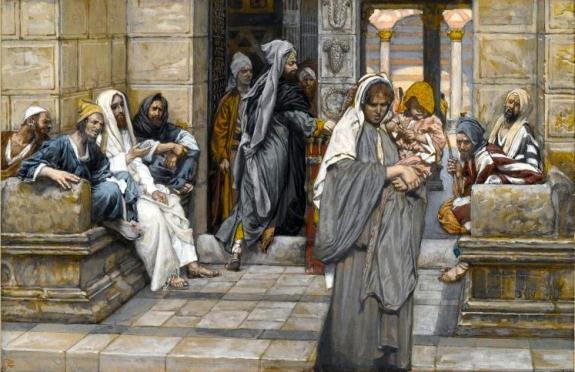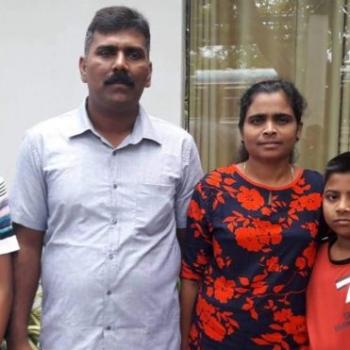
We never learn her name.
We never find out where she comes from, what she does, or even how old she is. We don’t know if she has a family.
Some images show her with a small child. But we don’t know if she has children or not – if she has other mouths to feed. We don’t know where she lives, or if she even has a roof over her head.
Perhaps she lives on the streets, begging.
We just don’t know.
All we know is she is almost impossibly poor, a widow.
But this one solitary, seemingly ordinary woman has endured down through history — one of so many fleeting figures who pop up in the Gospel and then vanish, but who leave an indelible mark.
The story of this encounter has been called “The Widow’s Mite,” M-I-T-E, a mite being the smallest of coins.
But it could be the lesson of “The Widow’s Might,” M-I-G-H-T. Because here, in this isolated story of a poor woman, we find a story of remarkable, unexpected power.
Whether we realize it or not, she is a mighty woman.
She is a figure who teaches important lessons to the disciples—and, two thousand years later, to us here and now.
First: this is a profound lesson in generosity.
We see in this widow someone who gives and gives and gives. She has nothing, but gives everything – perhaps keeping food off her own table (if she even has a table.)
How many of us would do the same? How many of us would have that kind of courage, that kind of selflessness?
And not just financially! When it counts, how much of ourselves are we willing to give? How much do we give our time, our patience, our attention, our talents?
How much of that do we waste?
Secondly: this is a humbling lesson in perception and prejudice.
This Gospel reading begins with Jesus mentioning the scribes in their long robes who “devour the houses of widows.” They appear to have everything — admiration, money, power, respect.
Yet, Jesus condemns these people who have everything — but then turns his attention to this woman who has nothing. She has no power, no influence, no authority. She is the kind of person most in the community probably overlook or ignore. Some might consider her a blight or a problem. She is quite literally a person on the margins. Why should she matter?
But she does.
Jesus tells his followers to take note of her: “This poor widow put in more than all the other contributors to the treasury.”
He opens their eyes — and ours — to another way of thinking about the poor, the neglected, the people who are shunned aside. And he gives this widow something she probably hasn’t had in years.
He gives her dignity.
He gives her honor and respect.
And, through the scriptures, he has also given her a place in history.
Here, too, we see the extraordinary power of this one solitary woman.
Here, too, we see just how much might she has!
It challenges us today, in our own time, to ask how we judge others like her. How do we view the poor, the destitute, the outcast? What about the elderly or the infirm?
Do we offer them dignity?
Do we consider what they have to give to our world?
Finally, and perhaps most importantly: this is a breathtaking lesson in trust.
This woman’s greatest power, her might, lies in her courageous ability to let go and let God. She gives without holding back. And she then has the faith, the trust, that God will provide.
One thing has always struck me about this Gospel: perhaps, in this woman, Jesus recognized someone very familiar. Maybe he saw similarities to his own mother — another widow, another person of limited means, but also someone who at a young age surrendered everything she had, every plan she might have known, every future she might have imagined, to trust in God’s purpose for her.
In pointing out this widow, perhaps Jesus was also in a way pointing out the woman who brought him into the world, one who also gave everything.
It is a reminder of what it means to live a life of faith and trust.
Do we even come close?
This Gospel compels us to reconsider what we have, what we hold onto, and what we so often refuse to give up. What are the things that give us a false sense of security? What are the things that are keeping us from giving ourselves over to God?
What are the things that are keeping us from truly living the Gospel?
It’s worth remembering that all of this is happening just days before Jesus will suffer and die. In Mark’s gospel, Jesus has arrived in Jerusalem to get ready for the Passover — but his eyes are on Calvary. So, at this moment, the one who will give everything on the cross pays tribute to an anonymous woman who gives everything at the treasury.
These final days of his are an opportunity to impart his final lessons to his disciples.
Last Sunday, we heard the two greatest commandments — love God, love your neighbor. Next week, we will hear Christ’s warnings about the end times. Our liturgical year is drawing to a close – but in Mark’s account, so is Jesus’s life.
And there are some things Jesus wants us to know before he is gone.
He is reminding us of the central tenet of the Gospel, his message for generations to come: a message of love, of mercy, of sacrifice.
But it is also a message of unflinching, unwavering faith.
It is a message that challenges us in ways we might not expect.
It says: We are meant to hold nothing back.
It says: Give.
It says: Notice what others miss.
It says: Remember those whom others forget.
And trust.
As we prepare to receive in our hands and in our hearts The One who taught us those lessons—and who showed us the ultimate example on the cross—remember the mightiness of this widow’s mite.
Remember the grace that comes from giving…from seeing with new eyes those we may often overlook or dismiss…and from trusting and believing in God’s will for our lives.
If we do, we may discover something we never knew we had.
The widow’s might — her “M-I-G-H-T” — could also be our own.












